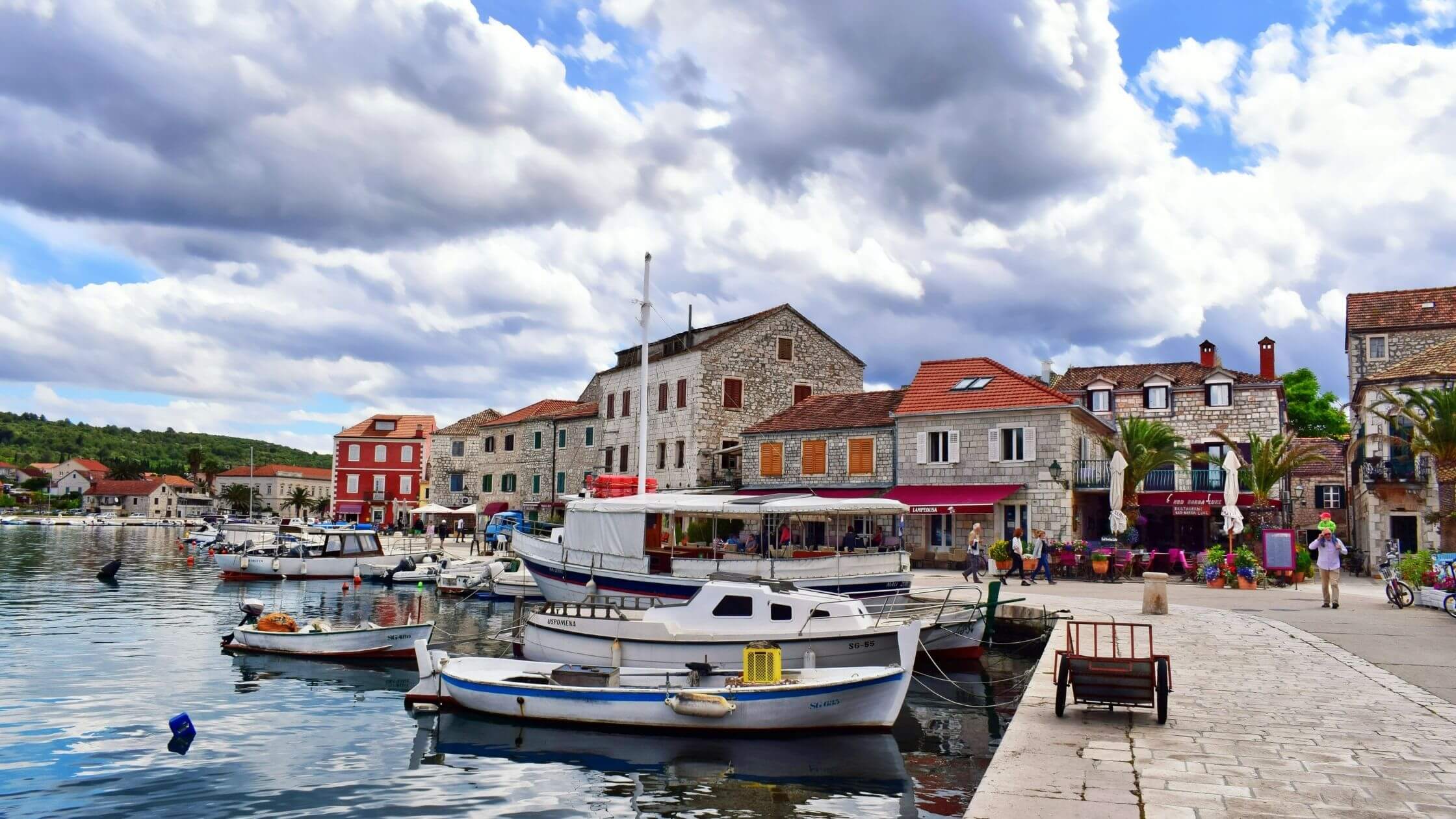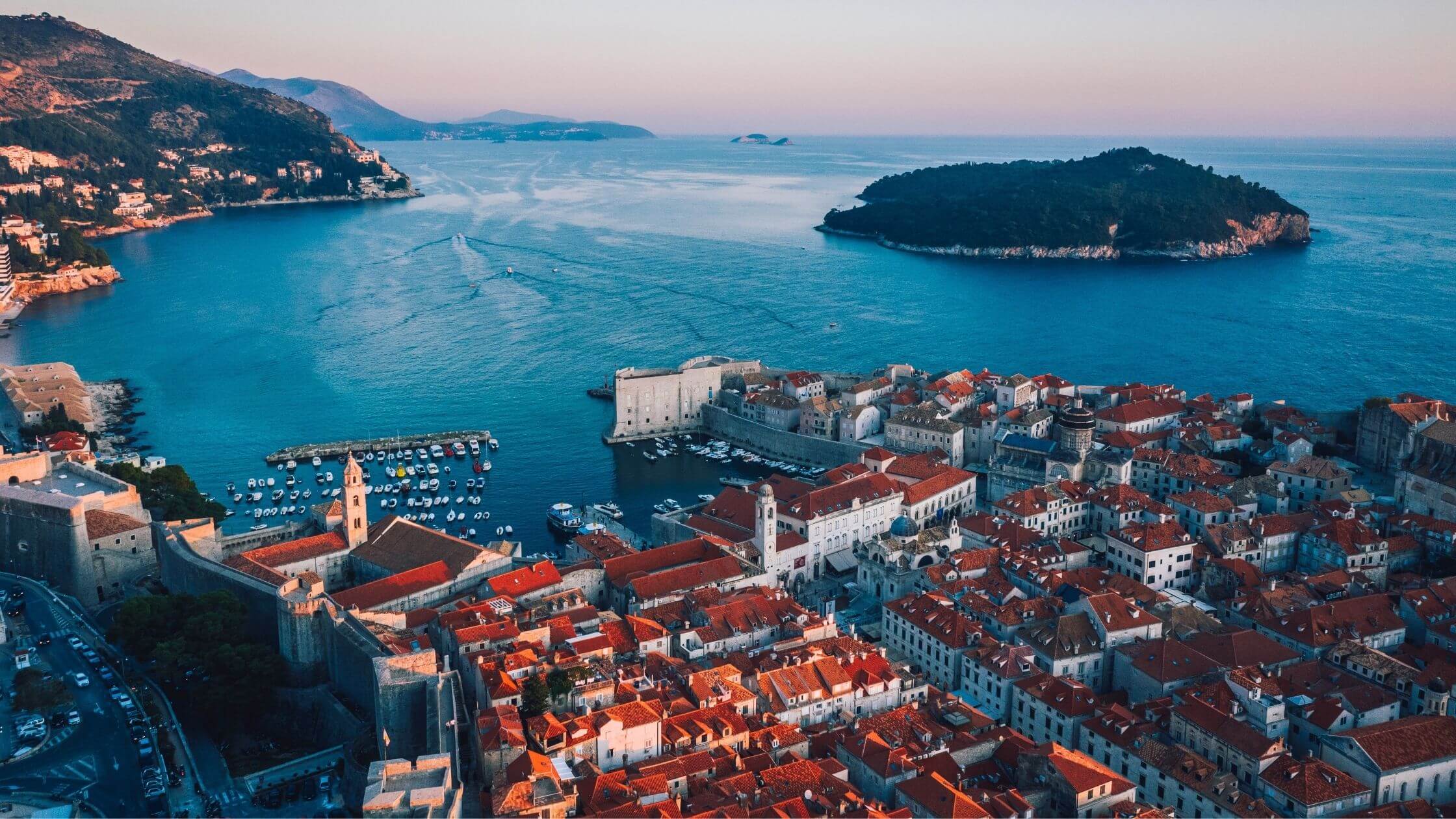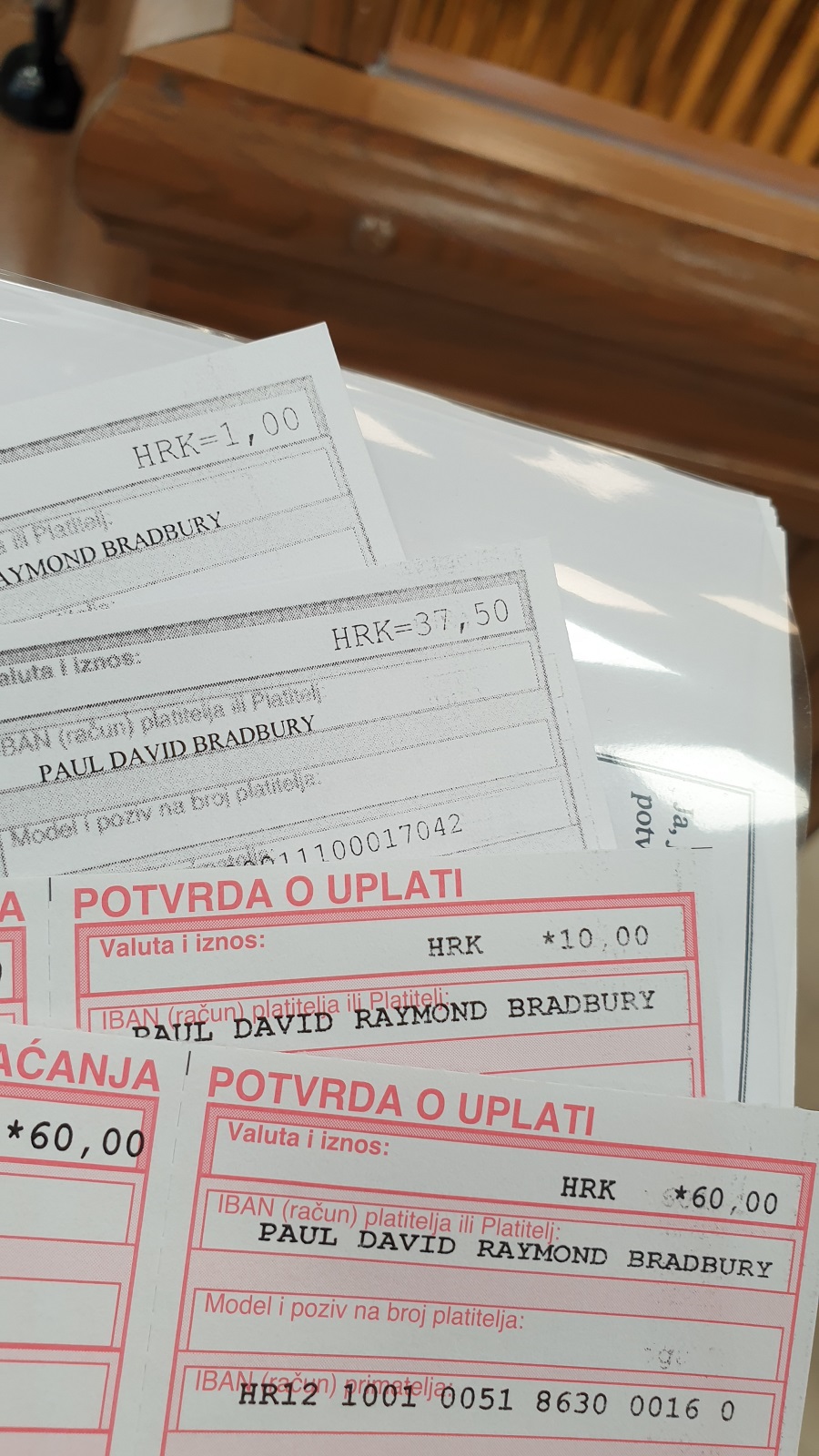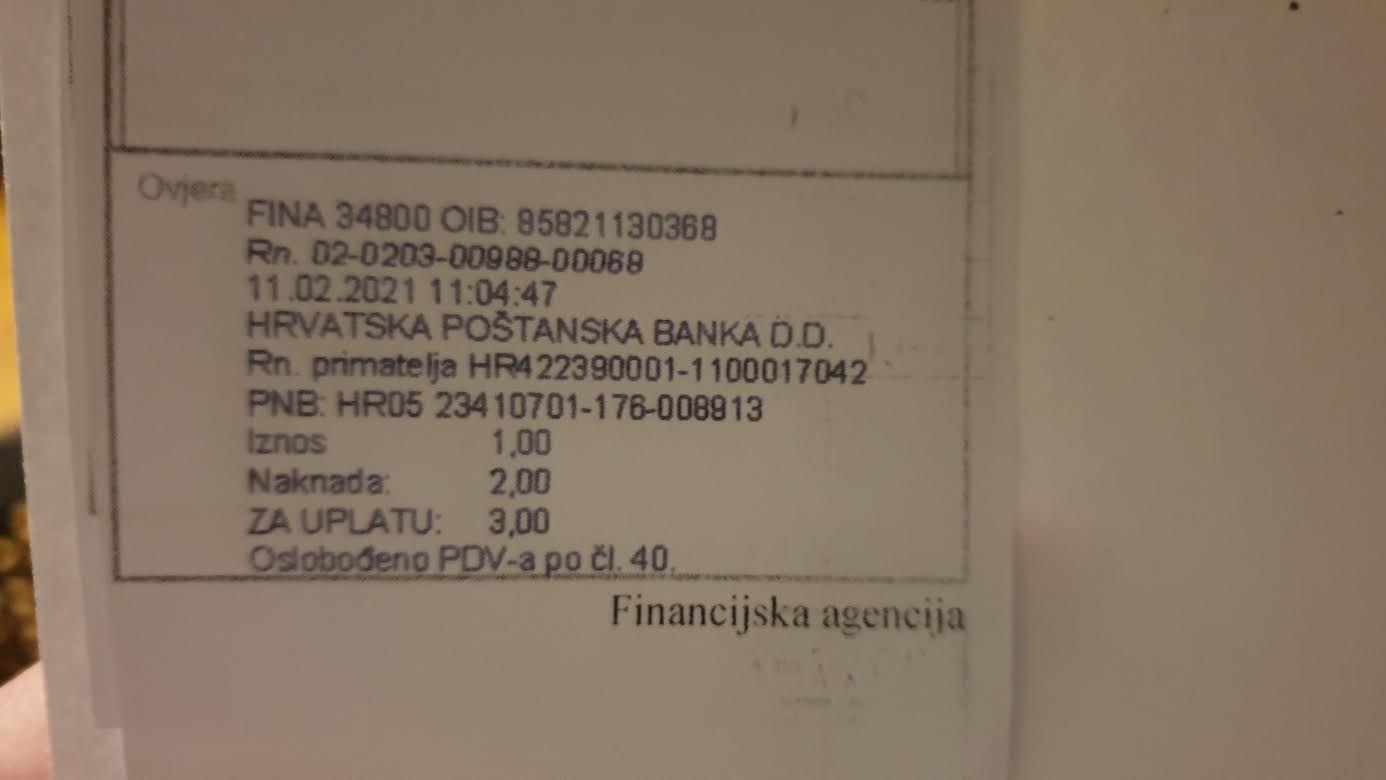Foreigner Opening Business Bank Account in Croatia: Ajme!
February 9, 2023 - Which bank would you choose? The one that told you that you had to drive 200 kilometres and wait 3 weeks to open a bank account, or the one that did it with a smile and a joke in just 46 minutes?
Not all heroes wear capes...
Over the years, I have learned that in Croatia, there is good bureaucracy and there is bad bureaucracy, and that while there are many in comfortable jobs who see customers as an irritation to their paid daily chill, there are others who go beyond the call of duty.
Legends like Nenad from Raiffeisen Bank in Varazdin.
Bureaucracy in the public sector is one thing, bureaucracy in the private sector quite another. A tale of two banks, one which required a 200 km round trip and 3-week waiting list to open a simple bank account, the other which could perform the task with a smile and a joke in just 46 minutes. Let's hear it for Nenad in the latest video episode from the Paul Bradbury Croatia Expert YouTube channel.
Read the original article here, which appeared on Total Croatia News, here.
****
What is it like to live in Croatia? An expat for 20 years, you can follow my series, 20 Ways Croatia Changed Me in 20 Years, starting at the beginning - Business and Dalmatia.
Follow Paul Bradbury on LinkedIn.
Subscribe to the Paul Bradbury Croatia & Balkan Expert YouTube channel.
Croatia, a Survival Kit for Foreigners is now available on Amazon in paperback and on Kindle.

How to Beat Croatian Bureaucracy: Proven Method
January 11, 2023 - Is it possible to beat Croatian bureaucracy? An impossible task, but there is an approach which brings the occasional win.
Croatian bureaucracy is legendary, but can it be beaten? There are various ways to approach it, including the right mindset, as I explained in my recent series, 20 Ways Croatia Changed Me in 20 Years - read more in 20 Ways Croatia Changed Me in 20 Years: 3. Bureaucracy and Mindset
But there is also one proven method - also available to locals - which can make Croatian bureaucracy a lot easier. And, as is usually the case in this magnificent but flawed country, it is a solution which was born out of necessity and creativity.
Croats are legendary at finding practical solutions for impossible situations, as they constantly find ways to deal with the absurdity of the bureaucratic jungle which engulfs them.
As I explain in the video below, it all started back in 2010, when the Internet stopped working at home, and I was told that it would be a week until the engineer could come and take a look - a lifetime for a blogger who relies on connectivity to spam the Internet.
An appeal on Facebook for a Croatian solution prompted a suggestion by private message, which resulted in a little trick which has great results. And you don't have to be a fat foreigner to try it - local friends have done so with success.
Here's the latest from the Paul Bradbury Croatia Expert YouTube channel - have you subscribed yet? How to Beat Croatian Bureaucracy: Proven Method.
If, like me, you have a mild obsession with Croatian bureaucracy, you might want to check out our series, Croatian Bureaucracy, a Love Story.
****
What is it like to live in Croatia? An expat for 20 years, you can follow my series, 20 Ways Croatia Changed Me in 20 Years, starting at the beginning - Business and Dalmatia.
Follow Paul Bradbury on LinkedIn.
Subscribe to the Paul Bradbury Croatia & Balkan Expert YouTube channel.
Croatia, a Survival Kit for Foreigners is now available on Amazon in paperback and on Kindle.

Croatian Bureaucracy - A Love Affair: Mission Prison Impossible, the Review
November 13, 2022 - Ines Vuckovic Dizdar, a 39-year-old woman from the eastern Croatian village of Petrijevci, went to the Osijek prison to serve her three-day prison sentence but could not get in. Her friends threw her a farewell party, and she packed her suitcase and left her children with her ex-husband to finally return home on the same day. Ines left a detailed review of the Croatian prison system and her bizarre experience in the Ženski RecenziRAJ Facebook group (female reviews group). Her brilliant review was shared hundreds of times.
As Jutarnji writes, Ines was supposed to go to prison because she had accumulated fines for driving without a driver's license. When she finally did all the required hours in the driving school and passed the driving test, she went to pick up her driving license with her certificate. She found out she could not get her driver's license due to unpaid fines. So she went to the prison in July 2018 but was not provided a spot there due to overcrowding.
"I am a child from the village, I have driven a tractor since I was little, and I also learned to drive a car. It's normal there. I needed a means of transport to deliver products from the farm", said Ines, who owns a business making natural products. When she went to pick up her driver's license, the clerk told her that she thought she had seen everything and nothing could surprise her, but Ines had proven her wrong. She told Ines that it was a shame she couldn't obtain her driver's license since her photo turned out so well. "I didn't have the money to pay the fine, and the statute of limitations would only kick in after three years. I decided to do community service to pay it off, and I was tasked with washing bus stops and cleaning the town hall that was being built at the time. A job is a job; I preferred to do that rather than pay a fine", said Ines. Bus stops were often plastered with posters with adhesive coating, making removal even more difficult. Ines called a friend who sprayed them with chemicals and saved herself the trouble of scrubbing and peeling. She treated him to beer and ćevapi, but she doesn't consider it "cheating."
"My eldest daughter brought me "worker's sandwiches," and I had coffee breaks. My friends were worried about how I would feel about cleaning the bus stops because there are always those who enjoy seeing you down and making fun of you, but it wasn't a problem for me at all", says Ines. While doing community service, she paid some of the fines in installments and kept driving using her test certificate. With two installments left to pay off the fine, she was stopped by the police again. She earned a new ticket for operating a motor vehicle before becoming eligible for that and ended up in court.
"The judge was not interested in whether I passed my driving test. She nervously yelled at me to show her the driver's license, showing me hers and explaining that it had to look like that. I told her I didn't have one while looking out the window to see if I would get another fine, considering that the hearing took longer than expected", said Ines. She was sentenced to a fine of three thousand kunas, followed by three days in prison. The judge immediately warned her that it would be difficult to get into prison and mocked her as she said. "I saw it was not worth wasting my energy; the judge had some personal issues. I even wanted to hug her. It wasn't clear why she was sending me to prison in the first place when she knew I wouldn't get in", Ines recalls.
She paid the fine and tried to get her driver's license. The officer told her that she could not get a driver's license until she served three days in prison and added that the prison was full and would not accept her. She advised her to wait three years for the period of limitations to expire and then pick up her license. She immediately remembered the judge's laugh when she was sentenced to three days in prison. "I was weighing out the probability of being stopped by the police because I had to keep working and providing treatment for my sick child. I decided to serve those three days because there was no way I wouldn't be stopped in the next three years. I made an appointment with the judge", she said. She explained to the judge that she had to transport apples and dried meat to the coast and that there was a chance that she would be fined again. She begged to be sent to serve a sentence of three days in prison because she had no other way to get her driver's license.
"She looked at me in wonder over her glasses. She said that she was 56 years old and that this was the first time someone was not asking for a delay but wanted to go to prison. We both started laughing", Ines recalls. She decided to write her a referral for prison, and one of the days she was supposed to spend in prison fell on her birthday. "I was delighted and commented that I would tell my grandchildren that I spent my birthday in prison. The judge said it was not right and that she would change the dates. She entered some dates, and that was it", said the future prisoner.
The judge explained to her that there would be a problem if she got stuck in prison for the weekend because there would be a possibility that she would have to stay longer than prescribed. She was given a list of what she was allowed to bring into the prison. "The list included hygiene items that must be in transparent packaging, medicines if necessary, trousers and shoes without laces, while bras, wires, and tapes are prohibited," said Ines. She thanked the judge and started looking for a connection to break into the prison. She asked if anyone knew a guard or anyone to help her break into the prison.
"I found out that the manager was a soldier. I called my ex-husband, a colonel, to see if he knew him. They asked him what had happened to put me in prison", said Ines. Her friends threw her a party before going to prison, they teased her for days, and then advice started pouring in from all sides.
"My mom acted like I was going to a Paraguayan prison, like from the Prison Break series. She warned me not to brag and not to mess with anyone. She assured me that the state would punish those guilty, and God would judge them", Ines recalled.
The mother of four was showered with advice from her children. She tried to turn everything into a joke to make it easier for them to get through that period. She joked that she would come back with a tattoo and visible abs.
"My eldest daughter Mirna said that the prisoners would be sorry when I got out of prison, and Doris told me that she bet I would click with a prisoner and remain friends forever. My son Šimun told me not to adopt another child, while youngest daughter Tessa asked if I would stay for a long time because she would rather be with me than with her father", said Ines.
To minimise her baggage for three days, she took a shower in the morning because she decided she would not shower in prison. "I put on a cotton top, two pairs of underpants, tights, and flip-flops because it was written that I had to have slippers without laces and buckles. I took a transparent toothpaste, a toothbrush, an ID card, five hundred kunas to put on the canteen card, put a towel on my shoulder, and was on my way", Ines explained. She handed the children to her ex-husband and arrived in front of the Osijek prison in flip-flops with a towel on her shoulder.
"I came to the doorman and hoped I could do my three days. I submitted the paperwork, and soon the deputy director appeared and told me there was no room. I tried to explain that if I didn't get my driver's license, I would have to keep cleaning bus stops until I retire", Ines said.
The director told her that two cells had to remain empty due to domestic violence emergencies and investigations, and priority was given to those with sentences longer than 14 days. The Osijek prison only has one women's wing, which was fully occupied. She asked if he would admit domestic violence to her if she had a little quarrel with her ex-husband.
"The deputy came back after about 15 minutes because he had found me a place in the detention centre. They didn't give it to me in the end so that I wouldn't sue them in the human rights court. Finally, they gave me written confirmation that I came to serve the sentence of my own free will and that the system did not allow me to do so. He said that even the judge called to help me get in", added Ines.
She went to have coffee and then to get her driver's license, which she was finally able to obtain.
"When people pass their driving test, they first tell their family and friends, and I told the police first. My father used to tease me that he was saving for my brother's education and my bail", said Ines.
Last year, the period of limitations finally expired, and now she no longer has to fear going to prison and serving a sentence.
Jutarnji asked the Ministry of Justice and Administration about this particular case and published the reply:
"Persons deprived of liberty are admitted to the prison system based on the decision of the competent court. When the competent court orders pre-trial detention or orders a person to serve a prison sentence based on a final judgment, the same person is sent to and admitted to a penitentiary or prison in accordance with the court's decision. Regarding your inquiry about the "order for serving a sentence for criminal offenses," we point out that persons deprived of their liberty are sent to the prison system exclusively based on clearly prescribed legal provisions that do not know the institution of "waiting."
Convicted persons are sent to serve prison sentences based on the decision of the execution judge who is competent to send them to serve prison sentences. We emphasize that the fundamental task of the prison system is to protect society from criminals. Anyone who poses a threat to an individual, organisation, or the legal order of the Republic of Croatia, and who has committed a misdemeanor or a criminal offense for which a prison sentence is prescribed, or who, by the Law, can or should be sentenced to pre-trial detention, may be sent to the prison system.
The prison system of the Republic of Croatia will receive all persons who have been deprived of their liberty by court decisions.
When it comes to the capacities of the prison system, the Ministry of Justice and Administration is implementing a series of measures to expand the capacities. In the last three years, the capacities of the Prison in Bjelovar and the Penitentiary in Požega were renovated and expanded, parts of the Prison in Osijek were renovated, and the closed facilities of the Prison in Požega were expanded, which increased the total capacity by about 120 places.
Works are underway in Požega and Lipovica, which will provide additional capacities of closed conditions for 230 places, relieving the prisons in Osijek and Zagreb.
The Ministry of Justice and Administration has introduced electronic monitoring for parole, and the preparation of the Rulebook on the method of execution of pretrial detention in the home with the use of electronic monitoring is underway, which will further relieve the capacities of criminal authorities, says the response of the Ministry of Justice and Administration.
For more, make sure to check out our dedicated Lifestyle section.
Croatian Bureaucracy for Non-EU Nationals: 5 Things I Wish I’d Known
February 8, 2022 - So, how does Croatian bureaucracy for non-EU nationals look? Lyn Church shares her first-hand experience.
Croatian bureaucracy is notorious for being a frustrating, anxiety-riddled process, where your confidence from reading countless “how-to” guides evaporates the moment you come face-to-face with any government official.
I'm sharing 5 pieces of advice that I wish someone had shared with me when we embarked on this journey.
Rather than a definitive “guide-to-something”, I hope it helps you better understand what you can come to expect as a 3rd country national when you undertake a bureaucratic process in Croatia.
1. Bureaucracy everywhere is tedious
If you think paperwork in Croatia is the absolute worst, the broader reality is that this pain point is not specific to Croatia. Bureaucracy, in general, is challenging, more so if you’re going through the process outside your home country, or in an unfamiliar language.
For instance, the time when I had to resubmit my Permanent Residency application to Immigration and Citizenship Canada. After months of collecting the voluminous documents needed for the application, they rolled out an entirely new system with new forms and requirements.
Or, when Parisian officials misplaced all my documents for l'Assurance Maladie after waiting 6 months, having to resend the entire dossier, before waiting another year to receive the equivalent of an HZZO card.
Even Sweden, so bureaucratically efficient you can file taxes via SMS, was prone to the occasional hiccup. Opening a bank account without a personal number (‘Personnummer’) was impossible, but at the same time, needing a bank account for a personal number was a wild game of chicken and egg.

Image: Pexels
2. Official information is often interpreted and executed independently from what’s written
Long story short, you can read, analyze, cite these regulations all you want down to the very letter, and still have things not go as planned.
Here’s one example from when we moved. According to MUP, I may be granted Temporary Residence under family reunification, “only if (my spouse) has had a continuous temporary residence permit for at least one year”.
Essentially, we had to live apart until his 1-year work anniversary in order to meet this requirement. Fast forward 11 months, we made the application and were subsequently told by officials that my spouse, as the main applicant, had to have been working for not one, but two years.
Fortunately, this was eventually resolved with some elbow grease, lots of patience, and a dear friend who doubled as a translator, but that’s a story for another day.
3. Seek anecdotal advice
Building from the previous point, I believe it’s best to seek advice from those who have successfully (or unsuccessfully) navigated the complex landscape.
Depending on which the most appropriate for your situation, reach out to expats, digital nomads, or retirees via social media groups, blogs, or websites. Don’t be afraid to ask for help!
This way, you get a first-hand account regarding the matter on hand and gain additional insights on living in Croatia in general. The one you’ll hear a lot around here is how Croatia, and Split specifically, is a different world during the Summer and Winter months.
As an added bonus, the services they may recommend (e.g. attorney, accountant, translator) are also more likely to be familiar with your specific situation and requirements involved.
A heads-up though that going the professional services route will not guarantee a positive outcome, nor will it hasten processing times.

Image: Pexels.
4. Be prepared to wait
Processing times will likely vary depending on what visa you’ve applied for but typically, from submission of documents to obtaining your Temporary Residence Card can be around 3-4 months. I’ve even heard of 6–8-month processing times.
Adding to this extended waiting period is that there is no way to track your application progress. A couple of days after submitting all your documents, you may receive an email confirming the application has been received.
Thereafter, it may be a month or more before you hear back from an official.
You can reach out directly to your MUP via phone or email, or through your attorney (who will likely also email or call them on your behalf) but getting a firm response on the progress of your application is unlikely.
The good news is that you’re allowed to stay and travel within Croatia while your Visa application is in process, so take this time to savor and explore.
5. Change happens quickly
Finally, the bureaucratic landscape in Croatia has undergone quite a few changes in the last few years. A process that worked for someone before, may no longer work today and vice versa.
For example, the fact that Croatia introduced a Digital Nomad Visa is a significant way forward for 3rd country nationals to stay for a longer term in Croatia which was not a viable option when we moved in 2018.
On the flip side, even with the first applicant approved in January 2021, there were still numerous uncertainties over what kind of health coverage was needed for applicants, the threshold for proof of income, or whether they would have to pay local taxes.
The requirements for healthcare (i.e. HZZO) were only finalized mid-February 2021, while proof of sufficient income significantly increased between the beginning of February 2021 and the end of February 2021.
That being said, we will always try our best to give you the most accurate, updated information when we can.

Harbour in Croatia. Image: Pexels
It seems difficult, why should we go through with this?
Well, it’s like asking someone, why does (something) make you happy?
It’s such a highly subjective feeling that is an amalgamation of situations, contexts, and interactions that makes life here really gratifying, in spite of the bureaucratic uncertainties.
All I can say is keep an open mind, come, see and experience living here for yourselves.
For more, check out our lifestyle section.
Retiring in Croatia as a Non-EU National: Navigating Bureaucracy
February 4, 2022 - Croatia is touted as being one of the best places to retire, with plenty to offer including an agreeable climate, rich culture, relatively low cost of living, and affordable healthcare. But how can retirees, especially 3rd country nationals, gain the right to live long-term in Croatia?
In this article, I briefly walk you through the different types of long-term permits the Croatian government currently offers and provide deeper insights into those that are the most applicable to retirees.
All information presented here is from the Ministry of the Interior (MUP) which regulates the stay of foreigners in Croatia.
Can I get permanent status to stay long-term?
The short answer is, yes, but for anything longer than 1-year, it becomes increasingly complicated.
For now, just know that although there are 2 types of Permanent Residency Permits in Croatia that allow extended stays beyond 1-year, it is nearly impossible for a 3rd country national to obtain either on arrival if you have no Croatian roots or family.
In order to stay for more than 90 days in Croatia, you must apply for a Temporary Residence Permit.

Time to get all that paperwork in order. Image: Anete Lusina/Pexels
Types of Temporary Residency Permits
According to the MUP, there are different ways for 3rd country nationals to obtain a Temporary Residency Permit.
- Work for a Croatian registered company
- Study at a Croatian institute
- Conduct scientific research
- Humanitarian grounds
- Be a digital nomad*
- Start a business
- Be a non-remunerated volunteer*
- Other purposes (purchasing real estate)*
- Other purposes (renting real estate)*
As of writing, these (*) options do not count towards gaining permanent residency or citizenship.
For those looking to retire, let’s briefly consider options 5-9 as the most appropriate.
The Digital Nomad Visa (point 5)
Introduced in January 2021, the Digital Nomad Visa provides a relatively straightforward way for 3rd country nationals to stay in Croatia for an extended period.
If you’re retired but do some freelancing from time to time, this may just work for you.
Criteria for a Digital Nomad Visa include:
- Proof that you are a digital nomad by providing documents such as company registration, freelance contracts, invoices, and payment from clients (documents should be translated into Croatian and notarized)
- A criminal background check from your home country
- Valid health insurance for 1-year (e.g. Cigna, Safetywings, Croatia Osiguranje)
- Proof of sufficient monthly funds which are 2.5 times the average net salary of the previous year as published by the Croatian Bureau of Statistics (DZS). For each additional family member, the amount is increased by 10% of the average net salary
- When this expires, you have to leave the country for 90 days before reapplying
As of October 2021, the average gross earning per employee as published by the DZS is HRK 9,597 (€1,275), while the average net earning per employee is HRK 7,140 (€948).
This means for one retiree; you need to show that you have a monthly income of HRK 17,860 (€2,367). For each additional member, it is HRK 714 (€95) more per month.
If your monthly income is irregular, you can also prove sufficient funds by showing you have a full 12 months of income in your bank account, HRK 214,320 (€28,424) for a solo retiree and HRK 222,786 (€29,545) if you are coming with a partner.
Starting a business (point 6)
Alternatively, for some retirees, starting a local business may be an ideal way to make some passive income while enjoying all that Croatia has to offer.
3rd country retirees can gain Temporary Residency by starting a business in Croatia, but meeting the required thresholds and the additional bureaucratic requirements can be more than a full-time job in itself.
To qualify, you have to:
- Own at least 51% of a Croatian company, or incorporate one of these business forms - obrt, j.d.o.o, or d.o.o.
- Invest at least HRK 200,000 (€26,500) as starting capital which can be claimed for business expenses
- You must employ yourself, as well as 3 Croatian nationals as full-time permanent staff
- The gross salaries of all 3 of your staff have to be equal to the average gross salary of the previous year
- Your own salary must be at least 1.5 times the average gross salary
For 3 members of staff and yourself, you’d be looking at a minimum monthly human capital cost of approximately HRK 43,186 (€5,738). Not to mention you also have to deal with taxes, health insurance and other miscellaneous paperwork.
Becoming a long-term volunteer (point 7)
Maybe starting a business is not for you, perhaps consider volunteering? According to Croatian law, long-term volunteers between the ages of 18-65 are allowed to stay for 1-year.
The requirements are as follows:
- You have to register your stay and apply for a residence and work permit
- The host organization (“udraga”) has to prove they will cover costs for your stay, including food, accommodation, and other necessary expenses
- You can be given an allowance by the host organization, but you cannot be paid
- You are not allowed to work for any other company in Croatia
- The hosting organization must possess a third-party liability insurance policy
Under certain conditions, this permit can be renewed for a second year if approved by the host organization and relevant authorities.

Real estate in Dubrovnik. Image: Lucian Photography/Pexels
Other purposes: Investing in real estate (point 8)
Unlike other EU countries (e.g. Spain, Portugal, Greece), Croatia does not currently offer a similar investment scheme where investing a certain amount in real estate qualifies you to live indefinitely.
In the case of Croatia,
- There is no set amount of investment required
- You must live in the purchased residential property
- The visa is only valid for 6 months which is extended to 9 months if you include the 3-month short-term tourist visa
- Once your 9 months is up, you are not allowed to renew or extend the permit
- You must wait 6 months and leave Croatia during this time before submitting a new application again
While there is no minimum investment requirement, the criteria of having to leave and resubmit an application make it difficult for retirees to settle permanently.
Other purposes: Renting real estate (point 9)
What if you’re considering the following retirement scenario: renting out your current residence that will help fund your retirement years in Croatia where you’d also rent instead of purchasing real estate?
You most certainly can but know that this route will also only entitle you to a 1-year Temporary Residency permit.
Let’s look at the additional criteria:
- You are not allowed to work for a Croatia registered company
- You have to sign a rental contract with the landlord and prepay a full year of rent (AirBnB, Booking.com does not count)
- The contract has to be notarized before submission to the relevant authorities
- At the end of your 1-year permit, you have to leave Croatia (although through anecdotal evidence, I have heard of this being extended for another year)
- You can only reapply again 6 months after the permit expires
While rent in Croatia is relatively lower than in cities in North America, Australia, or the UK, it also comes with its own complications.
Finding a landlord who is willing to lease you an apartment year-round can be difficult as the tourist season (June - September) brings in the bulk of their income. It is not uncommon for landlords to make a full year’s rent and more, just during tourist season alone.
What would retirement in Croatia look like then?
Until the rules change, it is problematic if you intend to live out a “classic” retirement scenario.
However, now that you know what to expect, if you’re willing to take on a more dynamic approach and make Croatia a secondary home as part of your broader retirement plan, it might just be some of the best year(s) of your life.
(€1 = HRK 7.54)
For more, check out our lifestyle section.
A Guide to Dealing with Croatian Bureaucracy: Renewing Documents
July 4th, 2021 - TCN's intern Marina Kaleb takes us through the important steps of renewing your documents and dealing with Croatian bureaucracy.
Have you personally struggled to find information online when it comes to renewing your documents in Croatia? I've spent days researching, contacting people, and trying to find out the process of how to get the supposed 12-hour rush/rapid/quick passport from Zagreb. It in fact took me over 24 hours to get a "one-day" passport, so here is what I wish I would have known before embarking on this journey on one of the hottest summer days in Zagreb.
1. Location
The MUP website includes all sorts of details such as payment details and parts of the process of renewing your passport but it is lacking a variety of details. In Croatia for all your documents, you need to go to the local police department. In Zagreb this is located on Petrinjska ul. 30. It is located close to the main square and fairly easy to find.
2. Payment
The MUP website provides a list of places where you can submit your payment from FINA, your local bank, or even online banking but what they don't tell you is that there is a post office within the same building which makes everyone's life a lot easier. As you enter the police department, the post office is located in the far left corner. On both sides of the office, they have a stand with pay slips for individual documents, for a rapid passport, you need to fill out two of the slips with your full name, address, and OIB number on the right side of the 410 kuna payslip.
3. Get there early
Be there bright and early just as the police department opens. I made the mistake of getting there at 9 am which I thought was fairly early and I spent good 3 hours waiting in the heat. Before you submit the payment slips at the post office within the building, pick up a number from the machine at the entrance otherwise you can wait for what feels like forever. At least by the time you pay for your new documents, hopefully, other people would have already left.
4. Patience will be your best friend
Being stuck indoors waiting for 2+ hours on a hot summer day will test your patience. Come prepared, bring water, a snack, a book, or listen to a podcast. Keep yourself occupied and time will pass by a lot quicker. There are around 4-5 counters usually working for urgent passports and the procedure is very long, so make sure you double-check you got everything you need before you start lining up. Also, the counters wait for about a minute to two before moving on to the next number so make sure to be quick and keep an eye out.
5. Working time
When I spoke to people who have been through this procedure before, I was reassured that I was going to get my passport the same day, in just a few hours. So I planned out my trip in advance, booked my bus seat for the same evening, and was ready to pick up my passport and get on the bus. However, nowhere online do they state that because of their summer working time from 7 am to 2/3 pm I believe (it isn't mentioned online), it in fact takes a full 24+ hours to get your passport. We were told to return the next day after 11 am to pick up our "rapid" passports.
After 24 hours of frustration, exhaustion, and stress I managed to get my new passport so I am hoping this will help someone else who is going to have a close encounter with the Croatian bureaucracy, best of luck!
For more on lifestyle, follow TCN's dedicated page.
Nanobit Founder Alan Sumina Disgusted by Croatian Bureaucracy
April the 2nd, 2021 - Nanobit founder Alan Sumina has made no effort to hide his disgust and frustration with the state of Croatia's draconian love of red tape and slowing down progress, taking to Facebook to voice his feelings.
As Poslovni Dnevnik writes, Nanobit founder Alan Sumina has commented on the slowness of Croatian bureaucracy and a system which appears to seek to actively prevent progress being made in business in this country. He posted a status on Facebook in which he described the process of opening a new company in Croatia. He spent as long as two weeks on the process and still hasn’t solved everything yet. He had to personally go to the counters at various offices, to the notary, to the bank, etc. An endless and mind numbing process those of us who live here know only too well.
Here is Nanobit founder Alan Sumina's Facebook status translated and delivered in full:
"It seems to me that twelve years ago it was easier to open a company here than it is today.
It's truly frightening to what extent the bureaucracy has destroyed this country and the extent to which it continues to destroy it. I'm just trying to open a new company, of course I naively thought that a power of attorney could be given to sort it all out on my behalf, but no, no. One must make a personal pilgrimage to the public notary, to the bank, to FINA, to the office for statistics… Then, ah, you don't need a stamp, but you do still need it, so don't end up just not making a stamp [because you'll still end up needing it], I was told that by the public notary).
Then comes the register of real owners. So, the sole founder needs to be entered into the court register, the matter couldn't be simpler than it is, but that needs to be entered into the register of beneficial owners which is dealt with by no more and no less than that fictional agency called FINA.
Great, I gave the power of attorney to my accountant to do it - but no, no, he can't do that. It has to be done in person. Or go and notarise the power of attorney at the public notary.
And so, as I have been for two weeks now, I'm still touring various counters just to start up a new company.
What's wrong here? Where is the abolition of those stamps? I've opened companies in the United Kingdom, Hungary and Romania. I've never had to stamp anything anywhere. I never had to go around the counters anywhere. This really is ab absolute horror, and it's not that we haven't moved forward, it's that we're actually going backwards!''
For more on Croatian entrepreneurs, doing business in Croatia and more, follow our business section.
Croatian Bureaucracy in Action: The Pain Required to Pay 1 Kuna
February 11, 2021 - Change may be around the corner, but watching Croatian bureaucracy in action in 2021 is quite the thing.
I have a very serious suggestion - an application should be made for Croatian bureaucracy to be given intangible UNESCO heritage status.
Before it is too late.
As parents, we look at the lives of our children in their gadget-infested worlds, and the things that were mainstream in our lives just a decade ago are already alien to them.
And so, too, it seems, in the world of Croatian bureaucracy.
Against my better judgment - and definitely against a promise I made to myself years ago - I opened a sole trader company in Croatia today, the so-called jdoo. And I have to report that things had certainly moved on since my last company formation. The whole procedure at the public notary took under an hour, my startup capital requirement was just 10 kuna, and I was only charged 547 kuna for the entire procedure.
A complete bargain. So much so, that I almost went back to start another.
But I was truly shocked at the response to one of my questions.
"Regarding the stamp, do I have all the paperwork to get it now, and where is the closest place to buy one?"
"This is 2021. You don't need a company stamp anymore."
What?!? How will this company function? And how can the next generation of Croatian entrepreneurs truly enjoy the Croatian experience without the joys of the company stamp to add to their daily frustrations.
If we don't document this moment in time soon, I mused, as I headed over the financial agency FINA to register my shiny new company. UNESCO could protect this gem before all was lost to posterity.
The security guard chap at FINA was very friendly and helpful. Once I had put my hand in the temperature check device, receiving a dollop of sanitiser with my temperature reading, I was sent to the very efficient gentleman assigned to my case.
Lots of documents to sign, and then I was given four payment slips (uplatnice), which covered various fees - one for 60 kuna, one for 37.50, my startup capital of 10 kuna, and - fabulously - a separate payment and bit of paperwork with a fee of 1 kuna, which I learned was to pay for the confirmation of my payment of 10 kuna startup capital. A 10% fee to confirm a payment may sound steep to some of you, but it was a bargain when I saw the amount of effort it entailed to generate the solitary kuna.

Before continuing, I should note I was a little disappointed that my 37.50 kuna came with a shortening of my names. All the other payments were registered to a Paul David Raymond Bradbury, but 37.50 seemingly covered only enough ink for three of my four names.
I reached for my wallet to pay, but was directed to another department, which handles the cash transaction, then told to report back to this desk with proof of payment. Ten minutes of queuing brought me to a very efficient lady, who took my four payment slips and expertly typed the details into the system. My 1 kuna payment had now taken two effort from two employees, and I was rewarded with a confirmation stamp with my returned slip.
But the 1 kuna journey did not stop there. Having returned to my efficient first staff member, he announced that he had to photocopy each of the four slips, one page each, for the records. Which he duly did with aplomb. I also got a photocopy of one, along with my four original slips. Croatian bureaucracy in action - this little kuna was definitely being earned by the State.
But then...
Having paid my bill of more than 120 kuna for services which I had calculated at less than 110 kuna, I went to check the little slip that had been returned to me.

My 1 kuna had become 3 kuna, as I was charged a transaction fee which was double the amount being requested. Suddenly, my 10% confirmation fee seemed a real bargain.
I am possibly the only person in the country who quite enjoys watching Croatian bureaucracy in action for its total absurdity. But with these forces of change, shall I lament the fact that it will soon be reduced to tales of an older generation in the name of 'progress'?
Does Varazdin Have Excellent Customer Service, or Am I Just Lucky?
Yet another efficient day (at least within the confines of what constitutes efficiency in the Croatian context) on April 3, 2017. Is Varazdin bucking the national trend when it comes to the legendary Croatian bureaucracy?


